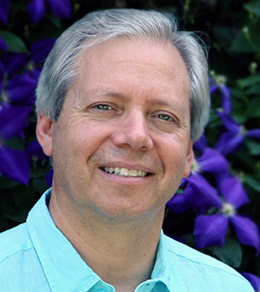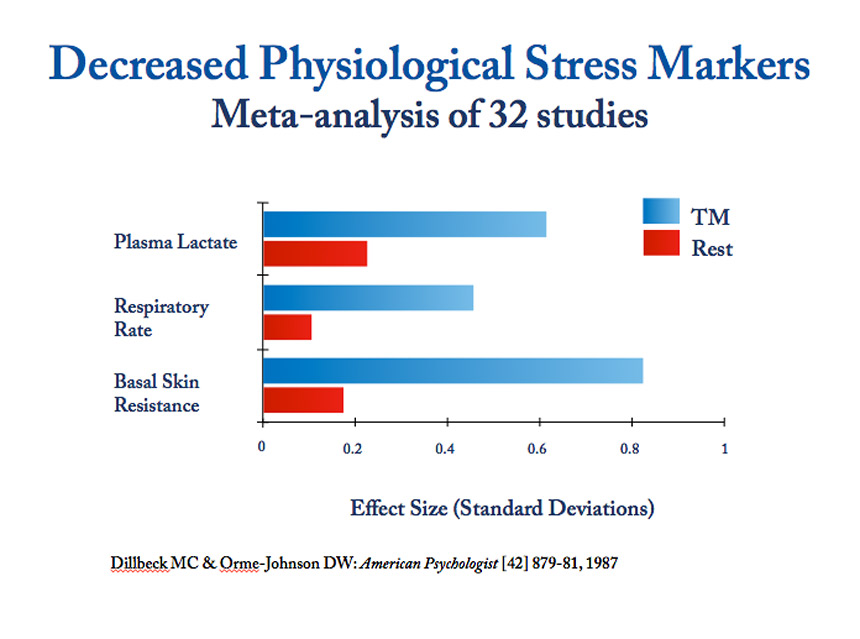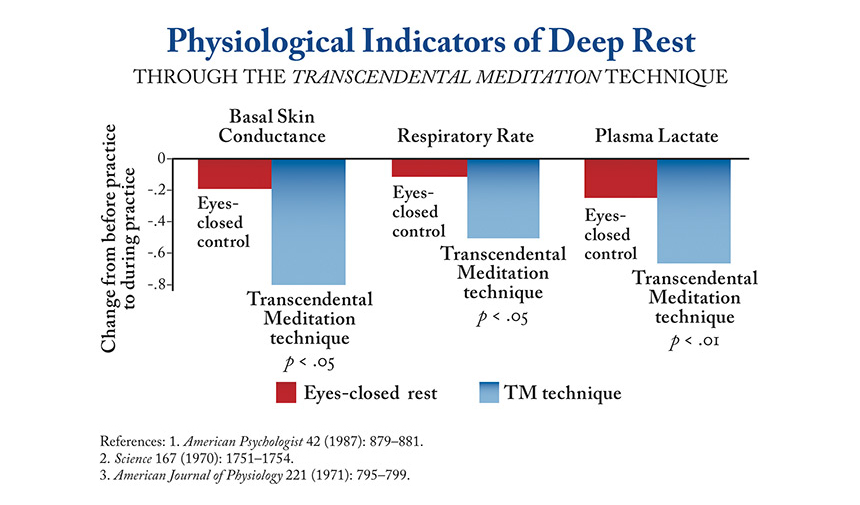Over a thousand new therapies have arisen since Freud developed psychoanalysis. We spend $317.6 billion annually on mental health.1 Yet 20 percent of our population is still suffering from a diagnosable mental illness at any given time2—and only half receive treatment.3 Clearly, our current system of mental health isn’t doing enough.
We need a new approach, one that addresses the root cause of most mental disorders—stress. Today, Maharishi AyurVeda® (MAV) offers both the knowledge and treatment that have the potential to fill this gap in our current mental health care system.4
Significant Advances, Yet Serious Costs
Mental health care has made great advances over the past century. For example, the advent of antipsychotic medicines, starting with Thorazine in the 1950s, enabled thousands of people with schizophrenia to live independently. Without such treatments, the majority of these patients were institutionalized for life.5
We need a new approach, one that addresses the root cause of most mental health disorders—stress. Today, Maharishi AyurVeda offers both the knowledge and treatment that have the potential to fill this gap.

Dr. Jim Brooks, author of Reflections on Maharishi AyurVeda and Mental Health
Similarly, new psychotherapies developed since Freud have helped many individuals gain deeper insight into their emotional issues. Moreover, these have helped people develop better coping strategies for dealing with life’s stressors.6
Sadly, in spite of these advances, only one half of the people with mental disorders receive treatment for their condition.7 This is due in part to the stigma that’s still attached to having a mental illness.
Military personnel, for example, worry that they won’t be able to return to duty if they speak up about having PTSD or other psychiatric symptoms. Because people are not asking for and receiving help when they need it, suicides in this country are rising at alarming rates—especially among teenagers and war veterans.
Many mental health medicines do great good—are literally life-saving. But in some cases their side effects may cause harm. Unfortunately, the third leading cause of death in the United States (about 250,000 per year) is iatrogenic, meaning medical treatment caused the death.8
Clearly, despite a century of advances, our current system of mental health has fallen short. A fresh theory and practice are needed.
A New Approach from Ancient Medicine
Modern psychiatry works at the mental, behavioral, and biochemical levels of the individual, and therefore has significant benefits. Yet the efficacy of these treatments is limited by their inability to address the basis of mental imbalance.
Scientific research now recognizes stress to be at the basis of many mental disorders. In addition to stress, other risk factors also exacerbate the development of mental illnesses. These include poor diet, lack of exercise, unhealthy habits like drug and alcohol use and other addictive behaviors, and insufficient rest.
Unfortunately, our current health care system is sorely lacking in effective methodologies for reducing stress or motivating patients to improve their diet, get more exercise and rest, and reduce unhealthy habits.
Maharishi AyurVeda is a new approach, one that addresses the root cause of the majority of mental disorders—stress. MAV offers both the theoretical and practical knowledge to potentially fill this gap in our current mental health care system.

Ayurveda is a 5,000-year-old system of natural health care from India. According to the ancient Ayurvedic texts, mental health is one of its eight major branches.
In the early 1980s, Maharishi Mahesh Yogi, Founder of the Transcendental Meditation program, began meeting with Ayurvedic scholars, doctors, and scientists. His purpose? To restore this ancient system of health care to its full stature and effectiveness. Therefore, this form of Ayurveda is called Maharishi AyurVeda.
The TM technique is the cornerstone treatment of Maharishi AyurVeda. During the practice of TM, the mind effortlessly settles into a state of restful alertness.
Restful Alertness Enhances Self-Repair
The Transcendental Meditation® (TM®) technique is the cornerstone treatment of Maharishi AyurVeda. During the practice of TM, the mind effortlessly settles into a state of restful alertness. Because of the intimate connection between mind and body, when the mind transcends the field of activity and experiences greater silence and pure consciousness, the body becomes very relaxed. Modern research demonstrates that in this state of Transcendental Consciousness, the metabolic rate reflects a level of rest even deeper than that typically seen during sleep.

A state of consciousness is a unique style of subjective functioning, correlated with a unique style of physiological functioning. In Maharishi AyurVeda, waking, dreaming, and sleeping are the first three states of consciousness. Transcendental Consciousness is the fourth state, which can be regularly experienced during TM practice.
It is this profound level of rest to both the mind and body that enables deep-rooted stress and fatigue to be released, effortlessly and spontaneously. For this reason, TM practice, along with other approaches of Maharishi AyurVeda, greatly enhances the self-repair mechanisms of the mind-body system.
Scientific research indicates that this self-repair occurs at the level of the DNA. This may explain the holistic mental health benefits, such as reduced depression and reduced anxiety, that people who take advantage of Maharishi AyurVeda technologies often experience.

Spontaneously Making Healthier Choices
Often, unhealthy behaviors are attempts to manage mental and emotional symptoms, like anxiety and depression, that may result from acute or chronic stress. Fortunately, when people make TM part of their daily routine and regularly reduce stress, they often make healthier life choices. These may include spontaneously reducing their consumption of alcohol or cigarettes.
In smuuary, when we practice the Transcendental Meditation technique, we regularly experience the deepest level of ourselves, pure consciousness or Transcendental Consciousness. This is a state of restful alertness, which is correlated with brain wave coherence and profound physiological relaxation. This rest, in turn, enables the self-repair mechanisms of our body to function most efficiently. This is at the basis of the potential for Maharishi AyurVeda to fill the gap in our current mental health care system.
References
- National Institute of Mental Health, Annual Total Direct and Indirect Costs of Serious Mental Illness (2002), www.cms.gov https://www.nimh.nih.gov/health/statistics/cost/index.shtml, accessed 2016-11-28.
- Newsweek.com, Victoria Bekiempis, http://www.newsweek.com/nearly-1-5-americans-suffer-mental-illness-each-year-230608, 2014-02-28.
- Mental Illness Policy.org, http://mentalillnesspolicy.org/consequences/percentage-mentally-ill-untreated.html, accessed 2016-11-28.
- Trauma and posttraumatic stress disorder in severe mental illness, Mueser K.T., Trumbetta S.L., Rosenberg S.D., Vidaver R., Goodman L.B., Osher F.C., Auciello P., Foy D.W.
- Psychosocial Rehabilitation Journal, 1993, 16(4), 11–23.
- Twenty-First Century Psychotherapies: Contemporary Approaches to Theory and Practice, Jay L. Lebow, John Wiley & Sons, 2012. Introduction. Citing Garfield 2006.
- National Institute of Mental Health, Annual Total Direct and Indirect Costs of Serious Mental Illness (2002), www.cms.gov https://www.nimh.nih.gov/health/statistics/cost/index.shtml, accessed 2016-11-28.
- Mental Illness Policy.org, http://mentalillnesspolicy.org/consequences/percentage-mentally-ill-untreated.html, accessed 2016-11-28.
- British Medical Journal, http://www.bmj.com/content/353/bmj.i2139, accessed 2016-11-28.
Jim Brooks, M.D., is a practicing psychiatrist who was the founding medical director of Maharishi AyurVeda Health Centers in Los Angeles and Washington, DC. He is the author of many journal articles and book chapters on Ayurveda and mental health. His book Reflections on Maharishi AyurVeda and Mental Health was recently published by Maharishi University of Management Press.


Comments
YOU MAY ALSO LIKE
Science & Research
New Study: Inmates Reduce Trauma, Reawaken Humanity
A randomized trial finds the TM technique is transformative for prisoners. "Inmates learn Transcendental Meditation and become more human after a long and isolating period of becoming less human," says co-author Dr. Tom O’Connor.
Better Health
Thriving with Bipolar: A Conversation with Writer/Director Paul Dalio | 8:32
Based on his own struggles with bipolar disorder, Paul Dalio wrote and directed Touched with Fire, a film exploring the passionate romance of two poets living with the condition.
TM in the News
American Institute of Stress: TM Heals PTSD | 7:47
The Dwight D. Eisenhower Army Medical Center Traumatic Brain Injury Clinic at Fort Gordon, Georgia, offers the TM® technique to Service Members and veterans.